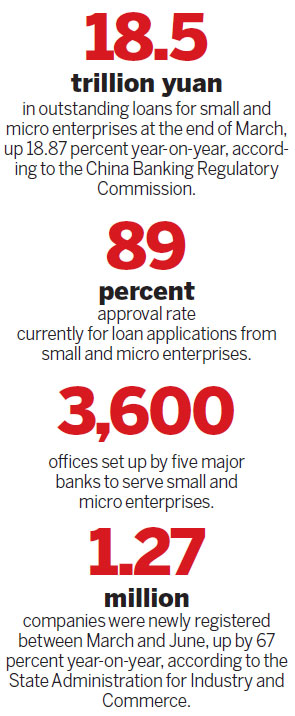Premier vows to lower hurdles for businesses
Updated: 2014-08-01 07:26
By Zhao Yinan and Li Xiaokun (China Daily Europe)
|
|||||||||||
|
In a visit to Inspur, a leading cloud service provider in Shandong province, Premier Li Keqiang said that he will recommend not only China's high-speed railway and nuclear power technologies but also its cloud service during future visits abroad. Liu Zhen / China News Service |
Li calls for banks to simplify lending process for first-time entrepreneurs
Premier Li Keqiang has pledged more financial support for new businesses to encourage entrepreneurship amid the continuing downward pressure on the Chinese economy.
"The government and state-owned banks must conduct in-depth research, change their work styles and mindset to find ways to make it easier for new businesses, which are largely small businesses, to get loans," Li told owners of small and micro businesses in Shandong, wrapping up a two-day visit to the coastal province.
Shandong's economy picked up slightly in the second quarter, after reporting 8.7 percent economic growth in the first, a moderate growth rate compared with other provinces.
Ten business owners had earlier attended a symposium with difficulty of getting financing their key complaint.
The State Council issued guidelines on July 23 that make it easier for businesses to get loans.

It listed detailed measures to ensure that more loans would go to small and micro businesses, the service industry, the agricultural sector and projects that safeguard the environment and improve people's lives.
Xu Hui, owner of an accounting company, one of the 10 businesses invited to the symposium, said most of her clients are small and medium-sized businesses, and lending is their biggest challenge.
Although many policies have been issued to ease financing for small businesses, Xu suggested that the government work out specific policies for newly registered businesses, because banks are usually reluctant to lend money to businesses newer than three years old.
"These businesses are in the early stages of development, usually with fewer contracts than the experienced ones, but that doesn't mean their development potential is weak," she said.
Concluding the symposium, Li said he hoped the business owners' enthusiasm would not be dented by complicated administrative procedures and unnecessary government supervision.
"We should not make the market economy like a hurdles race, where business owners have to leap over obstacles as they go through the administrative procedure for running a business," he said. "Otherwise they may quit soon after the race begins, or be bound hand and foot throughout the race."
Li has consistently emphasized the importance of serving the needs of small and micro companies through administrative and financial reforms during his many inspection visits this year.
"We should have micro-finance services for small and micro enterprises. The combination of the two 'micros' will be of great benefit," Li said during a visit to a small loan company in Shenyang, capital of Liaoning, in late March.
During a trip to Hainan province in April, he asked about the increase of newly registered local enterprises, which rose by 77 percent year-on-year in March, while registered capital that month surged by 247 percent.
"Streamlining administration and delegating power to lower levels will increase residents' income by making it easier for them to start their own businesses. The reform can also lower costs. That is what the government should do," Li said.
Contact the writers at zhaoyinan@chinadaily.com.cn.
(China Daily European Weekly 08/01/2014 page18)
Today's Top News
London hottest property for Chinese investors
Liberia shuts schools over Ebola
China's men no match for women?
Thai junta sets plan for fast rail links to China
Carnage at UN school as Israel pounds Gaza Strip
Abbas declares Gaza 'disaster area'
US House approves lawsuit against Obama
3 people killed, deputies wounded in NC shootout
Hot Topics
Lunar probe , China growth forecasts, Emission rules get tougher, China seen through 'colored lens', International board,
Editor's Picks

|

|

|

|

|

|






